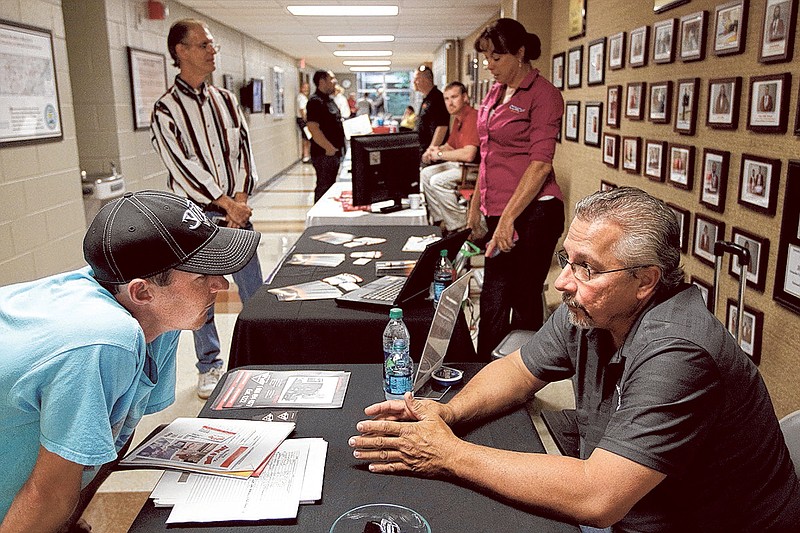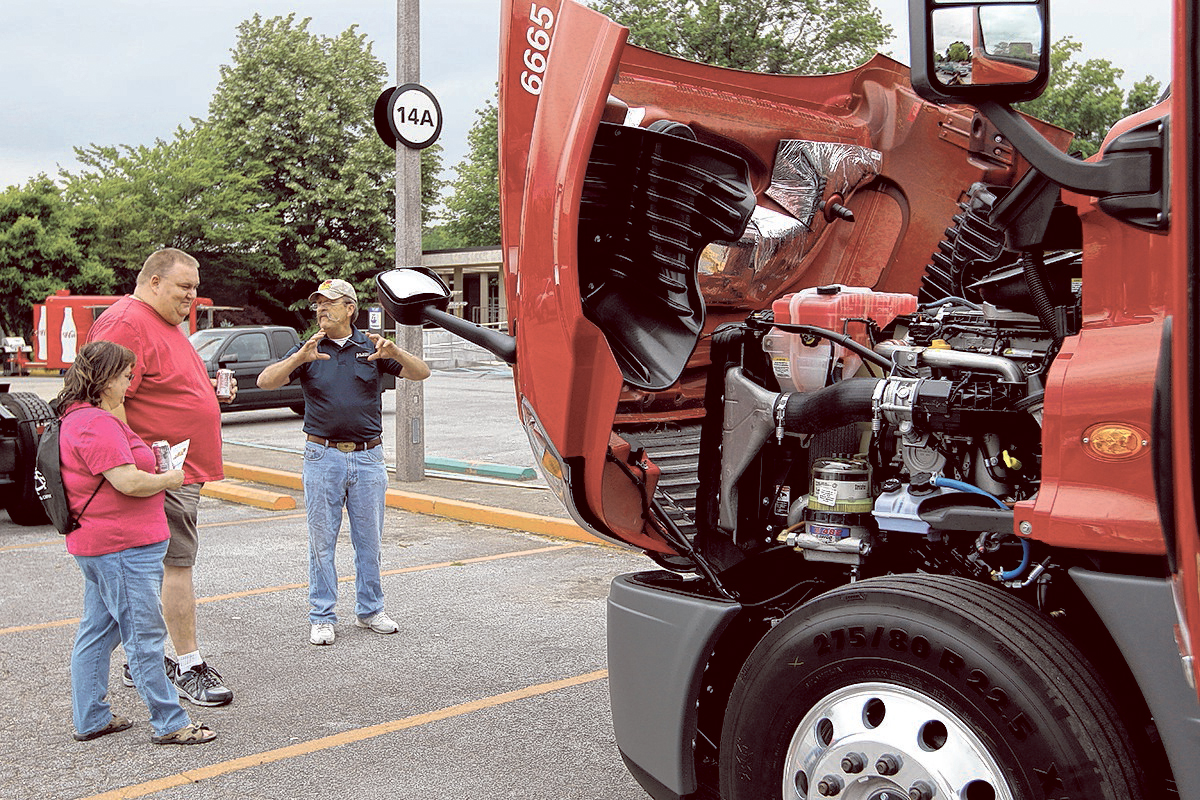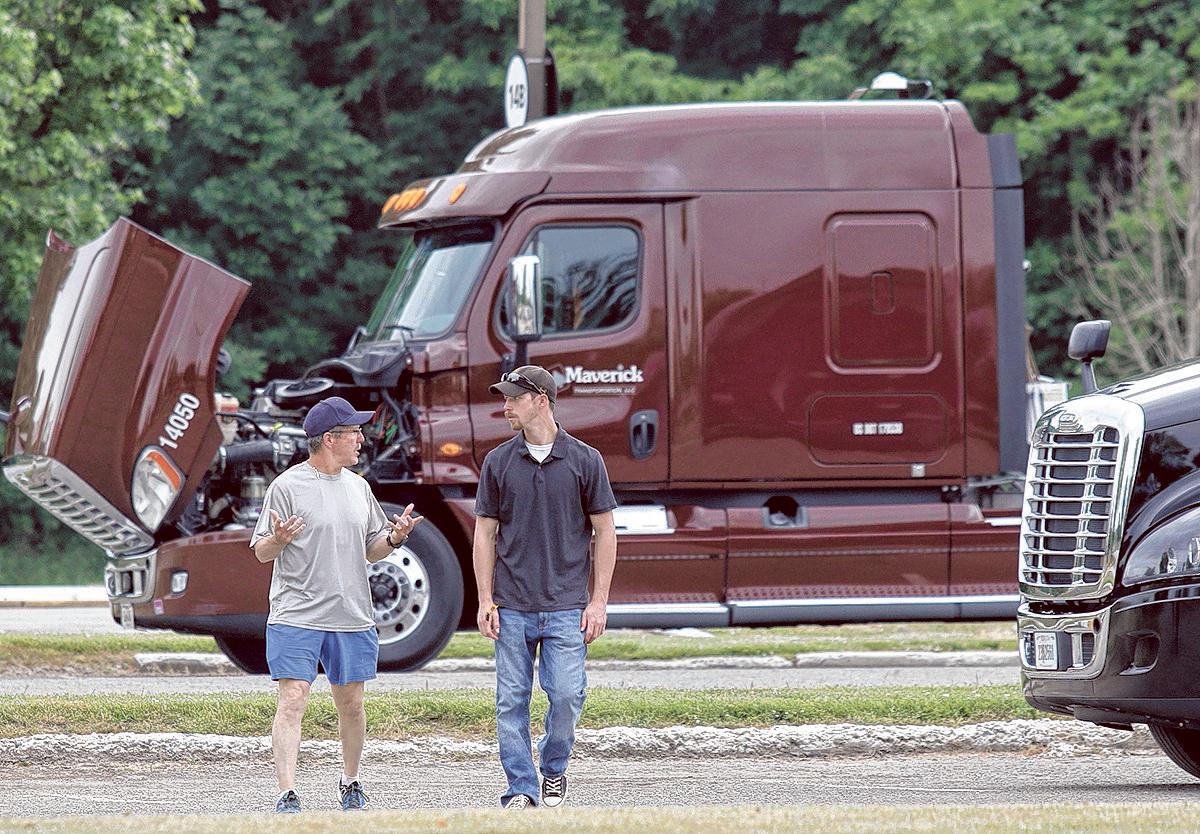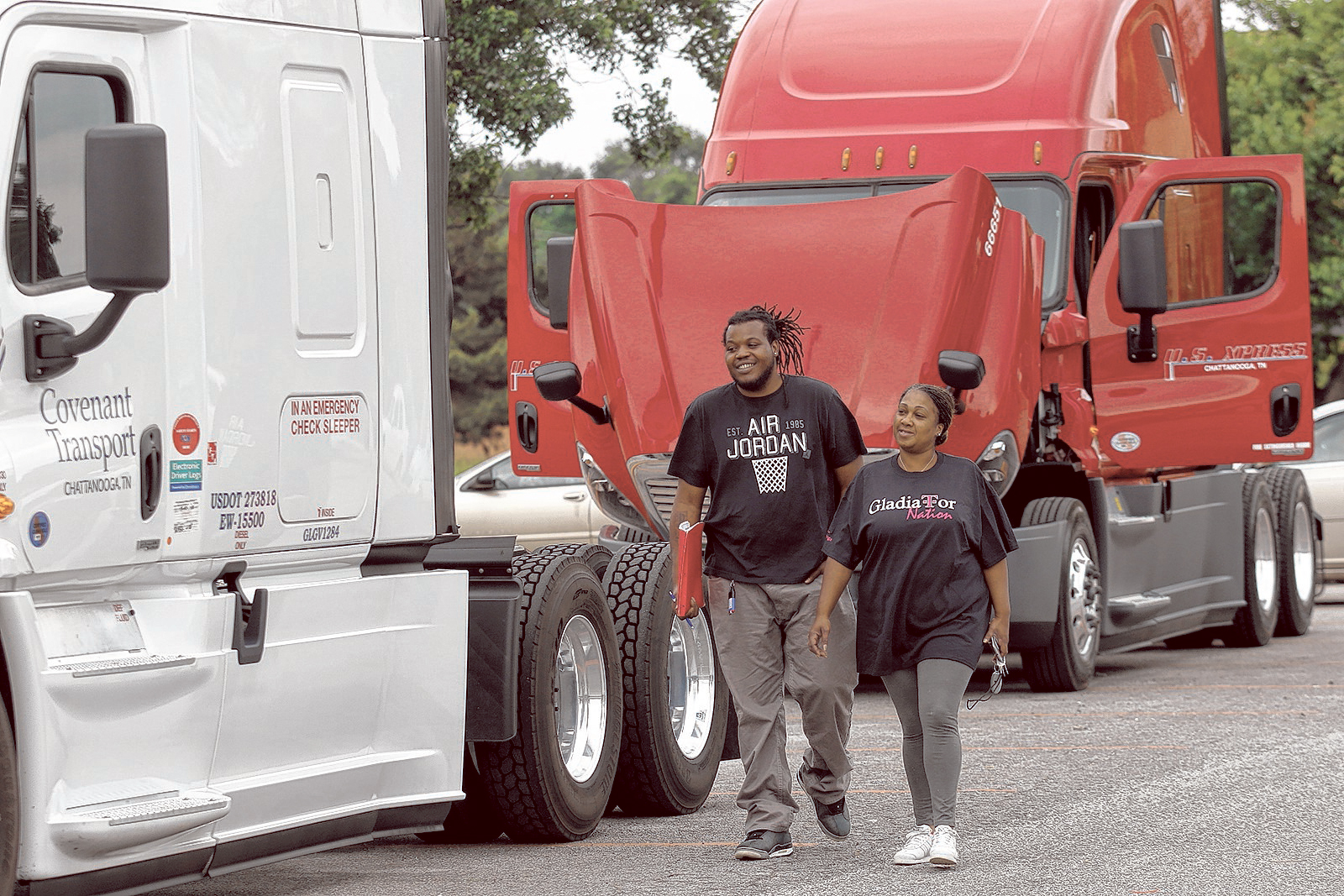By the numbers
3.4 million - Number of truck drivers in the U.S. 1.3 million - Number of carriers in the U.S. $41,930 - Average driver salary nationwide. 35,000 to 45,000 - Drivers currently needed. 239,000 - Projected drivers needed by 2022. 96 percent - Average turnover rate in long-haul trucking fleets. 9.96 billion - Freight tonnage moved by truck last year. 70 percent - Average amount of American freight moved by truck. 37 billion - Gallons of diesel fuel consumed each year by freight trucks. Source: American Trucking Associations, U.S Dept. of Labor, Bureau of Labor Statistics
In the mid-afternoon break between the morning and evening classes at Chattanooga State's commercial driving school, Linda BeBout explained how when she crawls up in the cab of one of the school's learner trucks and puts the shifter in gear, it will be her first time driving a vehicle with a manual transmission.
BeBout is a restaurant manager turned trucker.
She gave up a good job - and good salary - managing a Logan's Roadhouse to join her husband who drives for Prime, Inc., a Missouri-based long haul carrier.
Some mornings, BeBout brings in doughnuts for the rest of the 25-person CDL class, a holdover habit from her management days. Her story represents an unorthodox mid-life career transition, but one not uncommon in the trucking world.
Because in six weeks and with less than $2,000 out-of-pocket tuition, she can graduate from the Chatt State program, move to Missouri and join her husband as the other half of a long-haul driving team, making a combined six figures a year with little to no living expenses.
And the pay outlook in what are lean economic times for most industries is actually projected to only go up for truckers because there just aren't enough drivers to go around.
The country right now is smack in the middle of a major driver shortage nearing 40,000 empty seats, according to the American Trucking Associations.
And that has to change, say carrier executives and industry experts - even if it means dangling $50,000, $60,000 a year in front of recruits.
While winning over one Linda BeBout is a great start, it's become increasingly clear that wooing 39,999 more like her is going to take some doing.
***
All Rob Hatchett thinks about is drivers, he says.
Hatchett, vice president of recruiting at Covenant Transport, thinks about how to get drivers, how to keep them and how to make Covenant more appealing than the other 500,000-plus trucking firms in the country, as counted by the Federal Motor Carrier Safety Administration.
Hatchett thinks about how to overcome growing driver frustrations with federal hours of service, maximum truck speed and electronic trip log regulations.
He wonders how much money nontruckers have to have to make the jump.
Covenant has over 2,700 trucks and 6,700 trailers and ran an average 912 driving teams during first quarter of this year.
And still, the company could find work for newcomers immediately.
"If we could get 100 more teams tomorrow, we'd certainly take it," Hatchett said.
In reaction to the sharp dropoff in drivers following the Great Recession - a period in which many people flocked to trucking only to leave later when jobs came back close to home - Covenant has upped its driver pay more than once.
Brand-new drivers out of training start out making up to $46,000 a year. Experienced drivers start at around $55,000. Teams make $120,000 or more.
It's better pay than many recent college graduates find in today's workforce.
"We hear so much about the unemployment numbers, and we're sitting here begging to pay $55,000 a year if they've got one year's experience," said Hatchett. "We just kind of scratch our head and go, 'How is there a shortage?'"
It's because there's the old trucking catch.
"What is difficult is the lifestyle hasn't changed," Hatchett added. "Pay has gone up, equipment has gotten better, but there's nothing that's ever going to make that more enjoyable, being away from family."
Also, because choosing a life in trucking means giving up some creature comforts.
"Everybody's used to technology, and now you're going to get on a truck, and you're going to drive 10 hours a day, and you're going to kind of be away from that technology? Because you better not be texting and driving, that is a no-no," Hatchett said.
Covenant isn't the only Chattanooga carrier feeling the driver pinch. Officials at U.S. Xpress have similar concerns.
Eric Fuller, chief operating officer at U.S. Xpress, said at the end of the Great Recession, it was normal for company drivers to take jobs in the rebounding jobs market, especially in construction.
But instead of the driver exodus slowing down as the recession faded, it intensified, he said.
"And I would say that it's really gotten to a heightened state probably midway through last year," Fuller said. "So July, August, September was when we really started noticing, 'Hey, we've got a serious problem. It's not just tight, it's beyond tight, and we can't find enough drivers to seat all the trucks.'"
U.S. Xpress Enterprises - with its fleet of over 7,000 trucks and 19,000 trailers - could seat an additional 400 to 500 trucks tomorrow if it had the drivers.
"There are a number of companies, including ourselves, who have extra equipment we would seat," said Fuller. "And we have opportunities with customers that we would be able to book those trucks out if we had the drivers."
Empty trucks are more than an inconvenience for carriers. They themselves are major investments, sitting unused, not making any money or moving any goods.
To combat the shortage, U.S. Xpress has also raised driver wages, and now starts out paying its drivers in the low $50,000-a-year range.
And the company brought back its training program and put together educational packages to teach drivers what to expect in a life on the road, and how to adapt to it, whether it's eating right or being away for long periods of time.
The company goes out of its way to match team drivers with a compatible partner, even having applicants take an online survey and fill out questionnaires like a dating service. The goal is to have happy drivers who want to stay.
Currently, U.S. Xpress makes over 200 new hires a week, with over 60 percent of them fresh out of driving school, which was not the norm in the past.
But U.S. Xpress is not only battling the stigma of trucking and racing against competing industries for workers - they're also battling other trucking companies and a generally aging driver population that is getting out of the business altogether.
Fuller said U.S. Xpress is seeing about half the drivers who leave the company get out of trucking completely. The other half are shopping around for better wages, better routes and better home time.
Because what's happened thanks to intra-trucking competition is cannibalization, or one trucking firm cutting another's to win experienced drivers.
Also, thanks to old but persistent stereotypes, trucking is still not seen - despite its high wages and job security- as a go-to career.
There was a time when people "aspired to the job," said Fuller, a time when trucking was a way of life and carried a sense of camaraderie and adventure and loyalty.
But now, "I think our concern is there are not a lot of lifers," he said. "It's become a last resort job where they've tried other industries, or they've tried other jobs and they haven't been successful."
***
The American Trucking Associations projects that within seven years, the American trucking shortage could reach 239,000.
Hatchett and Fuller know that means even higher driver salaries and more incentives are likely on the horizon that will force companies everywhere to rebalance their operating income-to-expense ratios.
But it's not all bad news, at least not locally.
The Chattanooga State CDL program is going strong and has been for some time. The classes are full. The job placement rate is at 100 percent.
"Even new companies are wanting to come in here and hire students out of school now," said James Jones, instructor in the program.
And while there are drivers who leave the industry for a time and come back to get recertified and licensed, around 95 percent of students in the program are off the street, "people at dead-end jobs," who are looking for better, said Jones.
"They want to make more money," he said.
And they know they can in trucking.
Matt Rogers is living proof. He studied four years at East Tennessee State University and walked away in 2009 with a bachelor's degree, ready to go into surveying.
"I never thought I'd be in school again, that's for sure," he said.
Yet, he's getting licensed to drive a big truck.
Rogers is going to work with a friend at Glenn's Wrecker Service, making better money than what his surveying job pays.
But "even if it doesn't work out with the wrecker, I can always go on the road if I had to," he said. "You gotta do what you gotta do."
Patrick Sims, Jr., is in the same class and is working to get into long-haul, like his father before him. His fiancee is in the evening CDL class, and they plan on being a driving team, making big money for around five years then settling down with a fat savings account.
Plus, they'll see the country on someone else's dime.
"I'm going to have a vacation everywhere I go," said Sims.
Christopher Woodall is also in the class. He is finally chasing his dream of zig-zagging across the country in a tractor-trailer.
Woodall had a daughter with his high school girlfriend and for 18 years has worked at jobs he didn't like or want to make a living and be near his little girl.
"I wanted to watch my daughter grow up," he said.
But now she is going away to college herself, and Woodall has been pre-hired by Covenant and is going through the Chattanooga State program on their dime.
"This is something I always wanted to do," he said.
He quit his 6 a.m to 4:30 p.m. job driving a forklift to take CDL classes. He couldn't be happier .
"You can ask them," he said, students from the evening class trickling in the door at the Adams Road building. "I'm smiling going down the road."
Contact staff writer Alex Green at agreen@timesfreepress.com or 423-757-6480.



